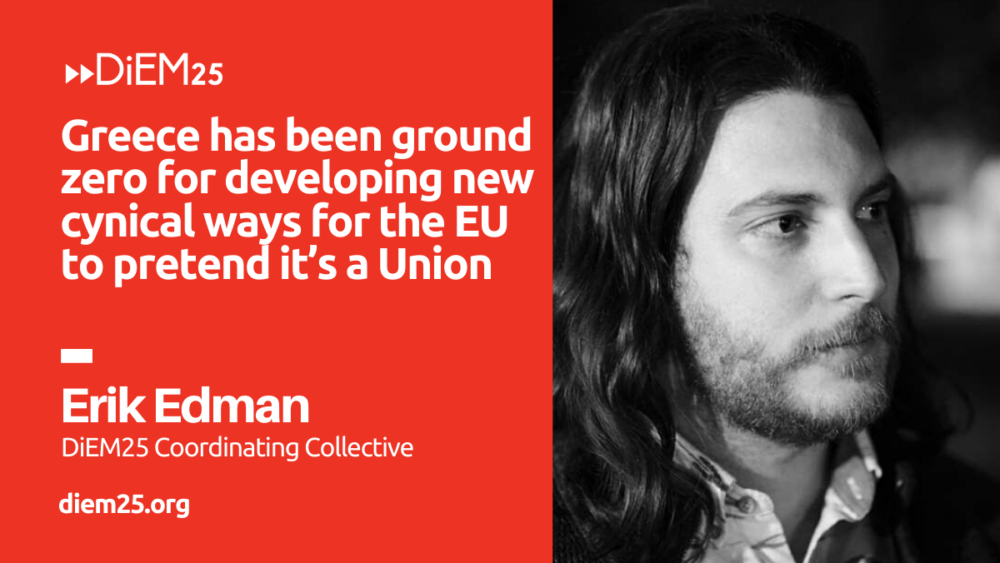For all the warnings, penalties and wagging fingers, Europe needs Greece to do its dirty work.
Ten years of European propaganda, portraying Greece as the continent’s prodigal son – a corrupt, inefficient, lazy relative that needs to be assisted, but also be purified through suffering for its sins – have created the perfect laboratory for the European Union’s most inhumane policies.
From how to deal with a financial crisis within a common currency zone without political cooperation, to how to deal with migration and asylum in a common travel zone without – you guessed it – political cooperation, Greece has been ground zero for developing new, cynical ways for the European Union (EU) to pretend it’s a Union, without ever truly becoming one. To allow for this cruel treatment of Greece and the souls that dwell there, everything is enacted under the useful dogma of “Greece deserves whatever happens to it”; a stance from which whatever help you offer, no matter how ineffectual and puny, is seen as a grand gesture of largesse.
Let us not dwell on the financial crisis, that still holds the country in a downward spiral of deepening crisis, while the numbers and spreadsheets reviewed and approved by the Commission reflect the continued rise of Greece’s parasitic oligarchy which is benefiting from the country’s fire-sale. Let us, instead, focus on current affairs: the situation on the Greek-Turkish border.
Since the crisis began in 2010, half-a-million Greeks have left their own country in search of work; refugees and migrants are obviously not arriving in Greece for a place in the country’s non-existent job market, or in search of security in this volatile part of Europe. They are on their way to the more affluent centre and north of the continent, and Greece, due to its geographic location, is the first step on that journey. The right-wing dominated Council (the governments of EU members) and Parliament (elected representatives from across the EU) in Brussels are unlikely to reproduce the facts in this light.
Even the technocratic European Commission, which has been touting its apolitical vantage point, dropped all pretense to impartiality when it announced in September 2019 the creation of a powerful position in Brussels tasked with overseeing migration policy, under the banner of “Protecting our European Way of Life”. The position was given, perhaps unsurprisingly, to a Greek: Commission stooge Margaritis Schinas.
The crème-de-la-crème of the EU’s leadership descended upon Greece’s Evros river border with Turkey, to review the situation at the Europe’s border. Rhetoric comparing Greece to Europe’s “shield” and congratulations for Greece’s government were shared, while videos and pictures depicting soldiers and policemen brutalising unarmed people and coast guards attempting to sink dinghys in the Aegean were being circulated online. This is the same government that described the influx of refugees and migrants as an “invasion” and a method of “asymmetric warfare”.
In the meantime, innocent people are killed or tortured while trapped between Turkey’s geopolitical power game and an EU held hostage by right-wing politicians. Politicians who have been promising ever more xenophobic and racist measures to their voters, hailing their electoral victories as a defeat of extremists, instead of what it truly is: the transformation of Europe’s conservatism to a mainstream far-right.
Europe is not only unwilling but also unable to help. Technically speaking, when it comes to refugees and asylum, it all begins and ends with the Dublin Regulation; the legislation that outlines how refugees are to be handled within the EU. Since the refugee “crisis” began in 2015, it has been in “review”. Five years later, it is no closer to a revision.
In Brussels, lacking a system of political cooperation, compromise is key. After half-a-decade of inaction, this means only one thing: the deadlock will only be resolved when the reform of the Dublin Regulation will be so watered-down that it might as well not have happened at all. While this policy merry-go-round continues, Europe throws, magnanimously, some scraps (700 million euros and 100 border guards) for its Useful Scoundrel to do the dirty work.
This political Gordian Knot that is the EU appears hopeless, but it is not. Dissolving the EU would only turbo-charge those who progressives are combating within the EU, and localise the struggle in every country. DiEM25 and its approach to political change is the only one that could lead to impactful results: a coordinated, united progressive political front across the whole of Europe, which will bring progressives to power at all levels, from the local, to the European, with a shared plan for change.
Europe will not change because we demanded it, or because we have a right to it. It will not change because it was reformed by experts. It will change when those in charge want it to change: and DiEM25 coordinates a common plan for those who wish to do it. Europe is unwilling and unable to help, but that can change. And when it does, the true capacity of progressive politics can be rolled-out in a way that national politics makes impossible.
Do you want to be informed of DiEM25's actions? Sign up here















